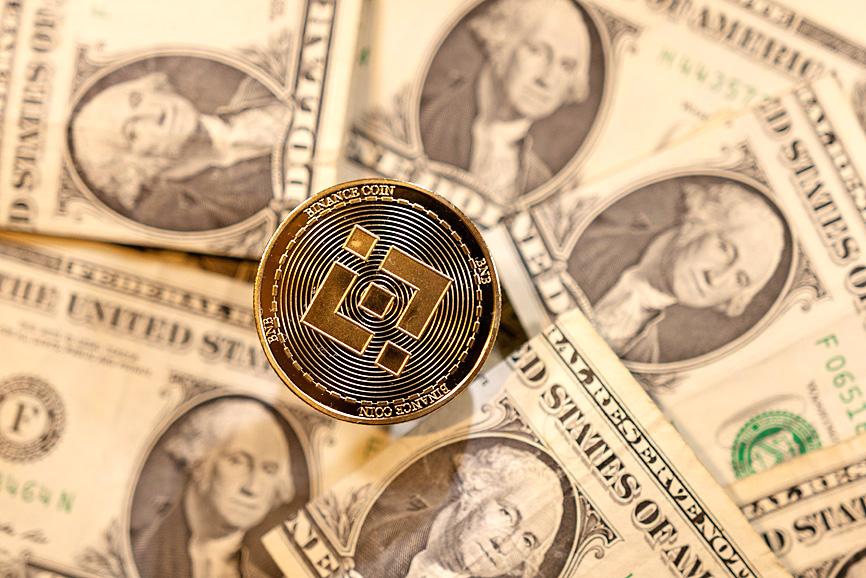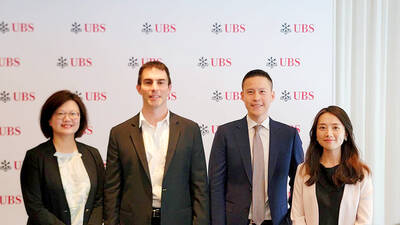Binance Asia Services Pte Ltd (幣安亞洲服務), the Singapore affiliate of the world’s largest cryptocurrency exchange, has withdrawn its application to run a bourse in the city-state, ending an effort that started last year to win approval from Singaporean authorities.
The fiat-to-crypto trading platform Binance.sg is to wind down operations and close by Feb. 13, Binance Asia said in an e-mailed statement.
The company was among about 170 firms that applied to the Monetary Authority of Singapore for a permit to provide cryptocurrency services.

Photo: Reuters
The withdrawal from the Singapore process is likely to end speculation that the Southeast Asian city-state would become the global headquarters for Binance, the company cofounded and headed by the entrepreneur Zhao Changpeng (趙長鵬).
“We always put our users first, so our decision to close Binance.sg was not taken lightly,” said Richard Teng (鄧偉政), chief executive officer of Binance’s Singapore entity.
“I am grateful to the Monetary Authority of Singapore for its ongoing assistance to Binance Asia Services and we look forward to future opportunities to work together,” he added.
Binance Asia has taken into account “strategic, commercial and developmental considerations globally” in its decision to withdraw its Singapore application, the company said.
Founded in China in 2017, Binance Holdings Ltd (幣安) has not set up a global base yet. Instead, Zhao has incorporated firms in locations where Binance operates.
Zhao, who holds Canadian citizenship and has been based in Singapore for the past two years, has given mixed signals on where he might base his firm, saying places in Europe and the Middle East offered pro-crypto alternatives along with Singapore.
The 44-year-old last month said that he had bought his first-ever home in Dubai to show a commitment to the jurisdiction he described as “very pro-crypto,” along with France.
Binance has also revived plans to register in the UK, Zhao told the Telegraph.
Cryptocurrencies extended declines after Binance’s move. Bitcoin, the world’s largest digital coin, fell as much as 3 percent to about US$48,484. Ether, the second biggest, dropped as much as 4.1 percent.
Binance Asia is to refocus its operations toward blockchain technology, the statement said.
Binance’s withdrawal of its Singapore application also raised questions about the future of Teng, a high-flying former regulator who joined the Singaporean entity in August. The Singaporean previously held roles including chief regulatory officer of Singapore Exchange Ltd, and spent 13 years at the Monetary Authority of Singapore.
All local employees will join the firm’s global operations and continue to contribute to the company, said Hazel Watts, a Binance spokeswoman in Singapore.

TECH TITAN: Pandemic-era demand for semiconductors turbocharged the nation’s GDP per capita to surpass South Korea’s, but it still remains half that of Singapore Taiwan is set to surpass South Korea this year in terms of wealth for the first time in more than two decades, marking a shift in Asia’s economic ranks made possible by the ascent of Taiwan Semiconductor Manufacturing Co (TSMC, 台積電). According to the latest forecasts released on Thursday by the central bank, Taiwan’s GDP is expected to expand 4.55 percent this year, a further upward revision from the 4.45 percent estimate made by the statistics bureau last month. The growth trajectory puts Taiwan on track to exceed South Korea’s GDP per capita — a key measure of living standards — a

Samsung Electronics Co shares jumped 4.47 percent yesterday after reports it has won approval from Nvidia Corp for the use of advanced high-bandwidth memory (HBM) chips, which marks a breakthrough for the South Korean technology leader. The stock closed at 83,500 won in Seoul, the highest since July 31 last year. Yesterday’s gain comes after local media, including the Korea Economic Daily, reported that Samsung’s 12-layer HBM3E product recently passed Nvidia’s qualification tests. That clears the components for use in the artificial intelligence (AI) accelerators essential to the training of AI models from ChatGPT to DeepSeek (深度求索), and finally allows Samsung

READY TO HELP: Should TSMC require assistance, the government would fully cooperate in helping to speed up the establishment of the Chiayi plant, an official said Taiwan Semiconductor Manufacturing Co (TSMC, 台積電) yesterday said its investment plans in Taiwan are “unchanged” amid speculation that the chipmaker might have suspended construction work on its second chip packaging plant in Chiayi County and plans to move equipment arranged for the plant to the US. The Chinese-language Economic Daily News reported earlier yesterday that TSMC had halted the construction of the chip packaging plant, which was scheduled to be completed next year and begin mass production in 2028. TSMC did not directly address whether construction of the plant had halted, but said its investment plans in Taiwan remain “unchanged.” The chipmaker started

LOOKING BRIGHT: Taiwanese tech stocks have been trading at 18 to 19 times earnings, beating the 15 percent long-term average amid AI-driven optimism, an analyst said Taiwan’s economy could expand by as much as 5 percent this year, fueled by its technology manufacturing edge amid a global artificial intelligence (AI) boom, while tariff exemptions on semiconductor products keep the country’s levy burden low despite a headline rate of 20 percent, UBS Investment Bank said yesterday. “Although Washington has imposed a 20 percent tariff on goods from Taiwan, exemptions for semiconductors keep the weighted average low,” UBS senior economist for Asia and China William Deng (鄧維慎) said. The growth momentum is expected to extend into next year, with technology companies’ revenue projected to rise 17 percent, UBS research head